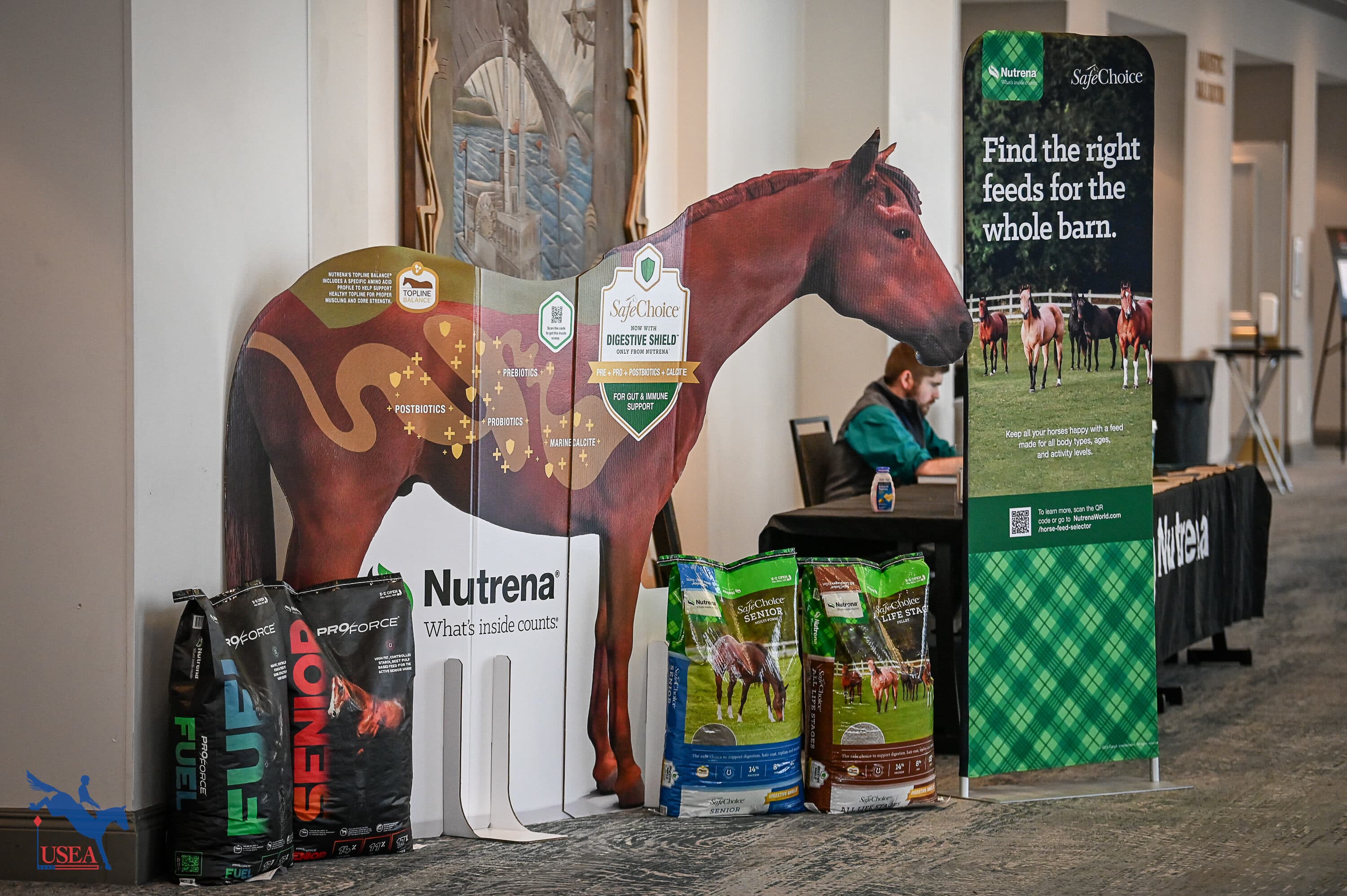Balancing the Bugs in Your Horse’s Microbiome with Nutrena

One of the hottest topics in any equestrian industry is gut health. Attendees of the 2023 USEA Annual Meeting & Convention were treated to a crash course in the equine digestive system led by Doug Leavitt and Alex Brannon with USEA sponsor Nutrena Feeds. Leavitt and Brannon talked in-depth about the role probiotics and calcite can play in gut and immune support in horses and how Nutrena’s newest proprietary blend, Digestive Shield, checks all of the boxes.
Is Your Horse Experiencing Gut Distress?
When you think of your horse’s anatomy, you can divide the equine digestive system into two sections—the foregut and the hindgut. The esophagus, stomach, and small intestines belong to the foregut, while the hindgut is made up of the caecum, large colon, small colon, and rectum.
With so many organs tied directly to digestion, it’s easy to see how gut distress could be hard to diagnose. The key to identifying a potential problem, according to Leavitt, is identifying common signs of gut distress.
“Gastric ulcers may present as a horse being unwilling to eat,” Leavitt shared. “They might be reactive to being saddled, resistant to touch or being brushed, or lack a good body condition.”
For example, if your horse has a rough haircoat, lacks muscling, or has poor hoof quality, they might be combatting a gut health issue.
Because the gut is an integral first line of defense for the immune system, horses who exhibit frequent episodes of colic, diarrhea, or other signs of a compromised immune system are also a good reason to investigate gut distress or a microbiome imbalance.
Your horse’s microbiome is the community of microorganisms that reside in a particular environment – in this case, the digestive tract. These microorganisms, or “happy bugs” as they are often casually referred to, include bacteria, protozoa, fungi, and viruses, and they serve an important purpose.
“Microorganisms live harmoniously in the horse’s digestive system,” commented Leavitt. “Happy bugs, for example, help break down the horse’s feed and forage and are aided by billions of bacteria, protozoa, and fungi, which we commonly refer to as gut microbes.”
Packing a Powerful Punch with Prebiotics, Probiotics, Postbiotics, and Marine Calcite
With such an important job to do, protecting your horse’s microbiome is essential. Through their research, Nutrena found that there are two powerful additives that can help your horse’s microbiome thrive: marine calcite and probiotics.
Probiotics are not a new concept in either horse or human health, but what is marine calcite and what does it do?
First, let’s break down the basics of the digestive process. Think of your horse grazing in a pasture or enjoying some hay in their stall. After they chew up their food, it makes its way to the stomach where the digestive process begins. Strong acids from the stomach begin to blend in with the food. Just because your horse has stopped eating, however, does not mean that their stomach acids stop as well. Because horses are designed for continuous grazing, these stomach acids are continuously produced and the effects of this acid on an empty stomach can be troublesome.
That is where buffering agents, like marine calcite, can be extremely helpful!
“Many horses, regardless of age or lifestyle, can suffer digestive upset,” Leavitt commented. “These challenges can be even greater in performance horses that are under stress from traveling, performing, and ever-changing schedules and environments. Marine-sourced calcium supports gastric health and helps maintain a normal stomach pH by increasing gastric juice pH and buffering stomach contents continuing up to two hours post feeding.”
According to Nutrena’s research, calcium alone is a natural buffering agent, but marine-derived calcium has up to two times greater buffering capacity in comparison to calcium carbonate. And, in addition to helping buffer the stomach, research has shown that marine calcite can also be beneficial in the buffering of your horse’s hindgut as well.
In addition, Digestive Shield also recruits the help of essential prebiotics, probiotics, and postbiotics to support gut and immune health.
Prebiotics provide support by offering the “fuel” for the happy bugs in your horse’s microbiome, while probiotics are actual living microorganisms that help increase nutrient digestibility. Postbiotics are the combination of inanimate microorganisms, cell wall fragments, and their metabolites that when fed back to an animal confer a health benefit.
Up Your Horse’s Defense Line with Digestive Shield
“Digestive Shield is a unique blend of prebiotics, probiotics, postbiotics, and marine calcite that combine to give you end-to-end support for your horse,” said Brannon. “Digestive support, gastric support, immune health, and more physiological benefits are all conferred with Digestive Shield, making it a great choice for every horse. From training, traveling, and competition horses to your retired best friend, Digestive Shield will support them all.”
Nutrena launched their Digestive Shield technology in 2023, and you can find this revolutionary equine nutrition product included in all Nutrena SafeChoice feeds, with the exception of SafeChoice Maintenance.
To learn more about DigestiveShield, visit Nutrena’s website here.














